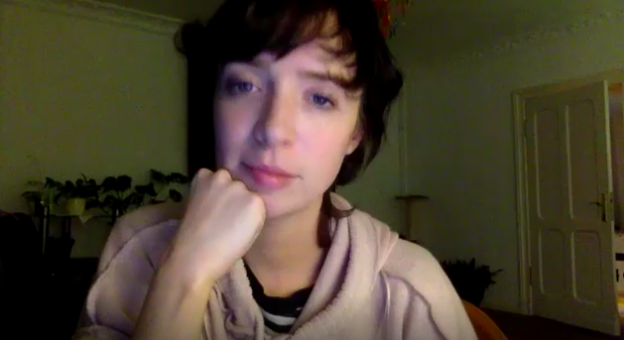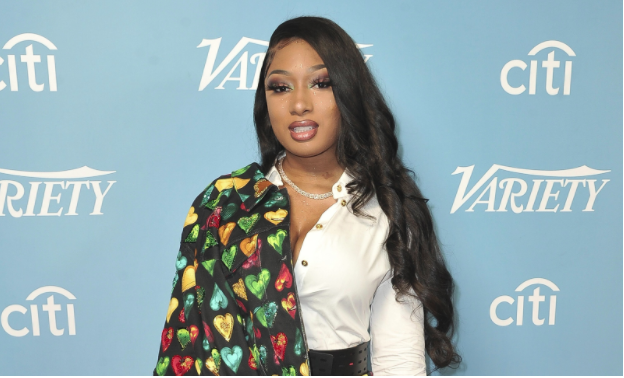Media Outlets and Ownership: A Conversation with Isabelle Hore-Thorburn
Hore-Thorburn is a weekend staff writer for Highsnobiety. She’s written articles about fashion, technology, music, and pop culture. (Nene Narh-Mensah/The Black Explosion)
One of the biggest pop culture stories of this year was the controversy surrounding the shooting of rapper Megan Thee Stallion.
In August, Megan said that rapper Tory Lanez had shot her. After that announcement, Lanez did not comment on the accusation but released an album in September titled “DAYSTAR.”
Hours after the release of “DAYSTAR,” online streetwear blog and production agency Highsnobiety posted an article saying that it would be their last time covering Lanez in their publication. They likened Lanez using controversy to promote his new album to the use of Breonna Taylor’s memory to “sell magazines, get clicks, and win political favor,” according to Isabelle Hore-Thorburn, a writer for Highsnobiety. Hore-Thorburn covered the shooting and the events that followed.
In the months since the news was announced, there have been many updates to the story. During the first week of October, Lanez was charged with shooting Megan Thee Stallion. He has since returned to his Instagram series, Quarantine Radio, where he hasn’t commented on the controversy.
Rapper Megan Thee Stallion didn’t name her assailant after the incident initially occurred back in July, but later came forward stating that it was Tory Lanez. (APNews)
With the newfound reckoning for editing with sensitivity, this story could signal that publications are changing their practices to reflect changing times. I sat down with Hore-Thorburn to talk about the process of writing her article and the impact it had. This conversation has been edited for length and clarity.
How did this story come about?
Hore-Thorburn: “We’ve got two news writers and one writer was on holiday that day. It was like we need to take a stand now, we shouldn’t be following anything that Tory Lanez is doing anymore.
I think if it had happened last year or the year before we might not have taken such a definitive stand. We might have just stopped covering it quietly, but I think because of the ruling on Breonna Taylor’s murder case I think that was one of the reasons.”
It was just so clear in the news, that Black women’s lives weren’t being valued and they weren’t being listened to. It seemed like the right thing to do.”
Do you think that a big decision like the one to stop covering Lanez could happen in the future?
Hore-Thorburn: “Yeah, I think so. A few months earlier when George Floyd was murdered, we released a statement. As a company, we had a reckoning where we had to confront the kind of truth that as an organization we had been profiting off of Black culture, but we weren’t in a meaningful way standing up where there are huge injustices against Black people, and specifically against Black women.
Obviously with [the] MeToo [movement] as well, we’ve had to come up with policies about how we talk about sexism and who we choose to represent and not represent. I think those things have made us create more definitive positions. Rather than making a decision based on who the editor and news writer is as each story comes.
Now that we’ve done that, in one way it’s a relief because we always have a position now. I really hope that moving forward we will make these kinds of big decisions.”
When was this decision finalized?
Hore-Thorburn: “We didn’t have a meeting or anything like that. We talked about it on a Slack channel. Someone sent it to me, I wrote the article. The editing gave it that headline, which I think was really powerful. Once it was shared on social media and the decision was made, we would not cover him anymore the circle was completed.”
So it was a company-wide decision?
Hore-Thorburn: “I wouldn’t say it was a company-wide decision. We’re quite a big company, the editorial team is one small part of that. So this was an editorial decision.
Because that decision was made, it was going to have implications because our commerce team, the magazine team won’t work with him [Lanez] anymore. Eventually, it was a company-wide decision because it has a spill effect.”
When this was coming about, were you assigned to write the story or did you volunteer to write it?
Hore-Thorburn: “I’m the only news writer. We pull all these different news stories and then they get organized depending on how urgent they are. Lots of differential people in editorial will throw them into the bowl. [Megan Thee Stallion] was the most important story of the day and I was the news writer. I think as an editorial team that was decided that it was the biggest story of the day.”
What kind of response did you see from the story?
Hore-Thorburn: “From inside the company, it was positive. People were saying, ‘it’s on Twitter and it’s kind of trending.’ I was looking through the Twitter responses — they were really nasty. Probably 70% to 80% of the responses were really sexist and really awful. Some of it was aimed at the story itself and some of them were specifically at me.
Then I went on the Instagram post. There were hundreds and hundreds of comments, some of it has been moderated. People started DMing me and sending me awful, violent DMs. Then people started sending me really nice messages saying ‘thank you for writing that.
We started getting really good feedback from readers, then some of our clients started getting good feedback. It’s gotten back to our CEO, and we found that they appreciated the stand we took, so that was nice.
I already was emotionally aware that if you’re a woman in the music industry, and particularly if you’re a woman of color, then you’re getting a lot of hate. There were so many awful messages directed towards [Megan], It just made me realize that I’m so lucky I’m not a famous person because people on the internet can be really awful sometimes.”
When you wrote that story were you expecting that kind of response?
Hore-Thorburn: “I wasn’t. Sometimes when you write those kinds of articles no one reads them.”
Have you seen any precedent for this article?
Hore-Thorburn: “I think if you had asked one of the people leaving the hateful comments, they would say these kinds of articles are way too common now. Because it’s cancel culture, potentially.
There’s a precedent for not giving abusers a platform. In house, we have a list of people who we shouldn’t be covered because they have a history of violence, sexism, racism or transphobia.
I don’t know if we’ve explicitly said we wouldn’t cover someone based on their actions. We usually would’ve just done that in a more covert way.”
What do you think was the impact of a story like this?
Hore-Thorburn: “It was really encouraging to see how within the comment section people were educating each other, speaking relatively nice to each other, explaining that it’s not about canceling someone. It’s about believing someone who has spoken about violence against them.
[Writer] Roxane Gay retweeted it and for me, that was very impactful. I think for us internally, it was really important to know that we could make these kinds of decisions and not be punished for it. Even if we were losing followers for it, they were an audience that we could afford to lose.”
Did you lose followers on any specific platforms or did the story boost readership on the site?
Hore-Thorburn: “The article got quite a lot of traffic. I think overall we ended up gaining followers. We were already told that it was ok if we were going to lose followers, which is not something we are okay with usually.”


